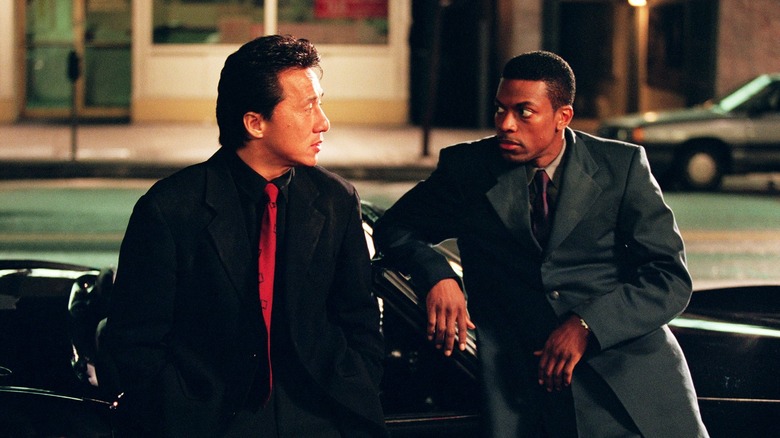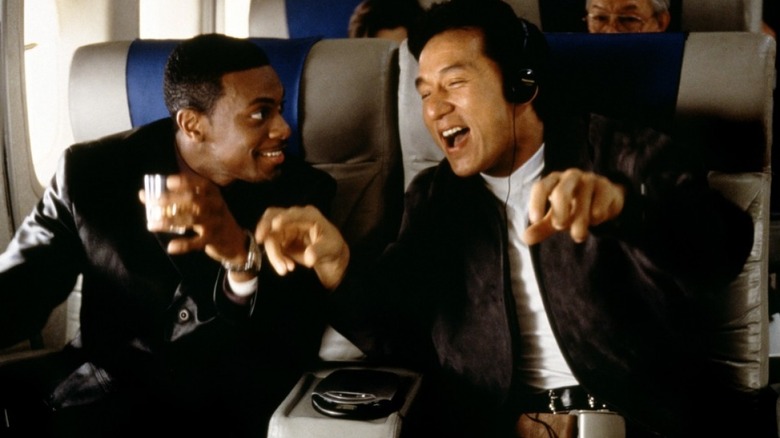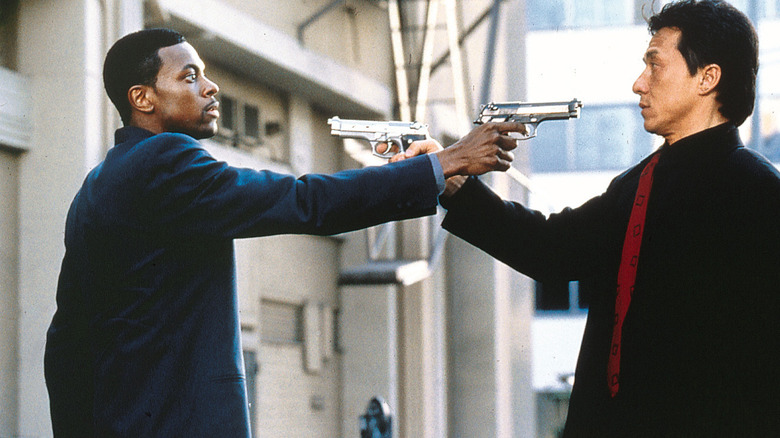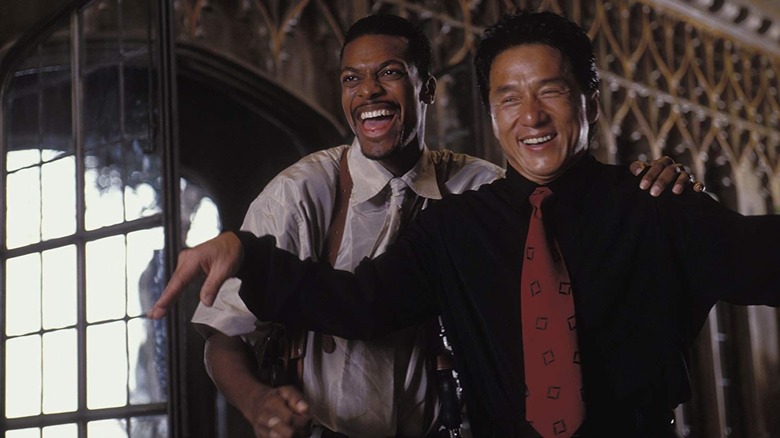Jackie Chan Had Some Conflicting Feelings About The Rush Hour Series' Success
By 1998, buddy cop movies were old hat, and critics of Brett Ratner's hit film "Rush Hour" were quite aware. The genre was well codified, and both critics and audiences acknowledged that any buddy cop movie is going to live or die depending on the strength of its leads. Ratner, already a friend of Chris Tucker through their collaboration on the 1997 film "Money Talks," had the idea to pair him with Jackie Chan, knowing of Chan's prowess as a movie star following the American release of "Rumble in the Bronx" in 1995. It was a pairing that made for a hit: "Rush Hour" made $141 million domestically on a budget of only $33 million.
The story is simple enough: A Los Angeles cop (Tucker) is paired with a visiting Hong Kong cop (Chan) to rescue the daughter of the Chinese consul, a friend of Chan's. In true buddy cop tradition, the two initially hate one another, but slowly learn to bond over their mutual expertise in investigations. Tucker is funny, Chan is a capable stunt performer, everything works out just fine, let's go get Jody Maroni's after the flick. It was enough of a crowd-pleaser to warrant two successful sequels in 2001 and in 2007.
Chan, however, was never entirely comfortable with "Rush Hour." Chan was well known for his action/comedy films in Hong Kong for decades (Chan is 18 years older than Tucker) and felt he understood the way cinematic comedy works. With "Rush Hour," well, he simply didn't think the movies were funny.
It was worse than Rush Hour 1
In a 2002 interview with the magazine Crosswalk, Jackie Chan admitted he experienced a great deal of disappointment and confusion over "Rush Hour," eventually realizing that what American audiences find funny is vastly different than what audiences in Hong Kong find funny. He even brought numbers to prove it, and it's telling that "Rush Hour" was not a success in Asia, and many of Chan's Hong Kong movies remained only cult hits in America. It took him two "Rush Hour" films to just accept that his American costars are being hilarious, even if he didn't think so:
"I like American people, and I think they will like it. Something I don't like is successful like 'Rush Hour,' I make the movie and I tell my manager, 'See? I should never make this kind of movie!' Then I go to Asia to make [an] Asian film. And they call me and say, 'Jackie, big hit! It['s a] success!' I say what? Then I make 'Rush Hour 2' and I hate it! Worse than 'Rush Hour 1!' And they call me and say, 'It['s a] success!'
Chan admits that he never, by his estimation, broke out of a Chinese mindset. He understood Chinese culture, and perhaps took for granted that his own sense of humor would translate. He realized American stars simply had an inverted sense of humor to his own:
"Then I slowly realize: Okay, I still have Chinese mind. I have 'hometown' mind. I don't get American culture, American dialogue. So now from that time on, I really listen to whatever Owen [Wilson] tell[s] me to say, whatever Chris Tucker tell[s] me to say. I realize, okay, anything I think not funny means, it's funny."
Bombing in Asia
And it wasn't just Jackie Chan's sense of humor. As mentioned above, the "Rush Hour" movies weren't hits in Hong Kong they same way they were in the United States. That was a validation of Chan's feelings. He continued to Crosswalk:
"Now with Asian film[s], I am right! I know what works and what doesn't. 'Rush Hour' release[s] in Asia, and [it] bomb[s]. Nobody [went] to see it! Yeah! Only 12 million! My movie? I make a Hong Kong film, and it make 50 million! You see the difference? If 'Rush Hour' not starring Jackie Chan, I think it only make half million in Hong Kong. That's all!"
Chan admits something of a mercenary attitude when it came to making the "Rush Hour" movies, and had already agreed to make a third at the time of the 2002 interview. As anyone who has seen "Rush Hour 3" might be able to intuit, it was done for purely commercial reasons. Chan admits as much, knowing he is a viable movie star in both the United States and in Hong Kong, affecting a "one here, one there" attitude.
The American markey
The early 2000s were a busy time for Jackie Chan, and he flew back and forth over the Pacific multiple times to shoot various American and Chinese projects. "Rush Hour 3" was going to be for, in his words:
"American market. Yeah, right now I know making a film for American market and every year I go back to make Asian film for Asian market. So right after 'Rush Hour 2,' now I'm doing my next movie, 'Around the World in 80 Days.' Right after that I go back to Hong Kong to make 'Titanium Ring.' It's a Hong Kong film for Asian market. But [the] Asian market film cannot release in [the] American market. Only direct-to-video. Even though I think my Asian film 'Accidental Spy' [is] 10 times better than 'Rush Hour 2'! Has anybody seen 'Accidental Spy?' You see it?"
The interviewers admitted they hadn't.
Chan, now 68, has slowed his roll, having made only three films to be set for release in 2022, all of them in China ("The Diary" is currently in post-production, and Chan does not appear; he served as director and producer). Chan's last onscreen appearance in a non-Chinese film was in Martin Campbell's "The Foreigner" in 2017. The same year, he provided voice roles in "The Nut Job 2: Nutty By Nature" and "The Lego Ninjago Movie."
Chan, while game, still has his hometown mind.



